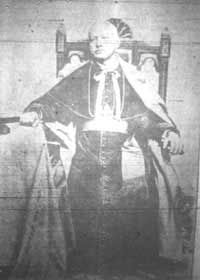|
| Msgr. Jorge I. Barlin | |
When the Spaniards left, taking along with them the practice of the Royal Patronage of the Indies, this meant that from here on, all Episcopal appointments must now come directly from Rome and Barlin was the first native Bishop of the Philippines to be appointed so. This brings into the fore that he was a stooge, a political appointee. Certainly not. He was not appointed by the Spanish church hierarchy, which at the time, had already left or were already being replaced by their American counterparts. Nor was he an appointee of the American Government who upon assumption of their sovereignty, instituted the doctrine of the separation of the church and state. Protestant America was even more inclined to support a nationalist church like that contemplated by some personages like the eminent Nationalist and writer, Isabelo de los Reyes. Barlin was a product of a search commencing in September 1902, three years before his Episcopal appointment, when the Vatican instructed Apostolic Delegate Guidi to find persons "worthy and fit of being elevated to the Episcopal dignity." Was such a choice well founded? Was he of great national stature to be accorded such honor? Apparently he was. For sixteen years he was Vicar Forane of the important province of Sorsogon. Respected even by the Spanish Governor to be consulted and eventually given reigns of Government of the Province of Sorsogon as the situation worsened for the Spanish rule in the Philippines. Barlin probably had a genius for diplomacy as he got along well even with the Filipino Revolutionaries and the American Occupation Forces who soon replaced the Spaniards. However, curiously, he was always suspected of communicating with the former as rumors of Filipino attacks seemed not to faze him. In the wake of the great nationalist fever following the founding of the Iglesia Filipina Independiente, whole towns, including their parish priests, in a show of nationalistic pride, defected to the Filipino founded church. It was easy to lose church property by a mere change of religious allegiance as what happened in Lagonoy, Camarines when Father Vicente Ramirez, backed by the Municipal Council, defected to the IFI and refused to vacate the church building. Barlin, as Apostolic Administrator of Nueva Caceres, took the cudgels in the fight for the rights of the Roman Catholic Church and brought action against both Father Ramirez and the Municipality of Lagonoy. Barlin won and the decision was upheld by the Supreme Court of the Philippines , chaired by the best American and Filipino legal minds of the period, two years after a lower court decided in favor of Barlin. "Who is Barlin?" A well informed answer would be that he defended the rights of the Catholic church in a period in Philippine history when the hated Spanish friars were blamed for the abuses against the Filipinos. The church that once enjoyed government patronage suddenly found fending for themselves under the Protestant government that separates the affairs of the church and the state. Barlin's court action against the Aglipayans of Lagonoy became the decisive case that solved the turbulent and sometimes violent dispute over church property. Three national events placed him in national prominence: The "accident" of being first, while not giving credit to the true worth of Barlin, is remarkable as it ushered a new age for the Roman Catholic Church in the Philippines. Before Barlin's election in a secret consistory in Rome in December 4, 1905, all Bishops in the Philippines were appointed under the rules of the Royal Patronage of the Indies, meaning, all appointments originated from the King of Spain. The Pope has only to sign an approval by way of a Papal Bull. Thus Barlin's appointment was the first in the Philippines to be made not by a foreign monarch but upon a thorough search and the recommendation of a papal delegate and the appointment coming directly from Rome. Under the Spanish rule, the Catholic faith was the national religion of the Philippines, thus the church operated almost as an equal with the Spanish government. Barlin's appointment came after Spain ceded the Philippines to the United States and the church operated under the American Catholic Church hierarchy. Thus Barlin was appointed under a new and foreign government with foreigners as peers, a unique situation in Philippine church history. Before 1905, all bishops in the Philippines were foreigners. A few having mixed parentage. Up to the last Spanish Bishop, all appointed bishops enjoyed the privilege of being considered true citizens of Spain, a "non-indio." Barlin became the first Philippine Catholic Bishop in 1906, who earlier was considered inferior because he was a Clerigo indigena or a native priest and an Indio by the Spaniards. Four years later, he died in Rome. His greatness may not be like those that accompany a nationalist or revolutionary clergy, a path taken by some of his contemporaries, but by his strong sense of duty. Indeed he did his job and saved lives. He defended the church for which he considered himself an insignificant member. His Episcopal motto serves as the best assessment of his worth for which he worked and aspired: "To be a good soldier of Christ."
|
|
|
|
